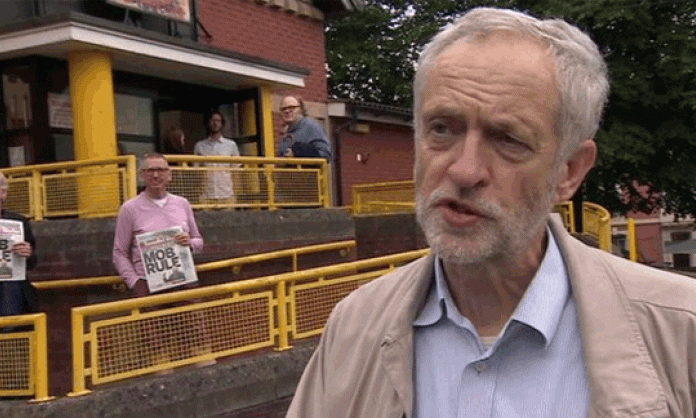Jeremy Corbyn isn’t going to lead the second English revolution. Odds are that he won’t even get to be prime minister. But the fact that an unreconstructed leftist looks increasingly likely to become the next leader of the unrelentingly Blairite British Labour Party is transforming UK politics.
Corbyn says he wants to tax the rich, radically redistribute wealth, end austerity politics, abolish the Trident nuclear weapons program and apologise for Tony Blair’s decision to join the US war on Iraq.
His record in parliament is one of obstinate refusal to go along with Labour’s long march to the right over the past three decades. In parliament, Corbyn voted against the Blair/Brown Labour governments more than any other Labour MP – between 2005 and 2010, 25 percent of the time.
If that wasn’t enough, Corbyn is said to have divorced his first wife because she insisted on sending their son to a posh school. He also thinks that, when journalists ask him a question, he should answer using actual words rather than spin-doctored phrases.
In the eyes of the establishment, all of this rules Corbyn out as an acceptable leader of the Labour Party. But while there was some tut-tutting from the Labour Party aristocracy when Corbyn was nominated as a leadership candidate, no one thought he had a serious chance of winning.
Now, in the final days of the campaign, Corbyn looks like a runaway winner. He has galvanised hundreds of thousands behind him, packed out rallies and meetings across the country and sent Labour Party powerbrokers and the whole stuffy British establishment into a frenzy of uncomprehending rage.
Tony Blair led the charge, claiming, “The Labour party is in danger more mortal today than at any point in the over 100 years of its existence … The party is walking eyes shut, arms outstretched, over the cliff’s edge to the jagged rocks below”.
Initially, the attacks on Corbyn focused on his “unelectability”. But as tens of thousands of people flocked into the Labour Party, these arguments began to unravel.
Polls revealed that Corbyn’s anti-austerity arguments were galvanising traditional Labour voters disillusioned with the party’s shift to the right and thousands of young people who have never before seen a left wing politician break into the mainstream. On top of that, voters across the spectrum viewed Corbyn most favourably of all the Labour leadership candidates.
A survey by Survation found 32 percent would be more likely to vote Labour at the election if Corbyn led the party, ahead of Andy Burnham on 25 percent, Liz Kendall on 22 percent and Yvette Cooper on 20 percent.
Tellingly, Corbyn did particularly well among supporters of the populist right wing UKIP, an indication that it is possible to challenge the appeal of racist scapegoating with a clear anti-austerity message that directs legitimate anger about the state of British society against bankers and the rich, rather than migrants.
As “Corbynmania” has intensified, so have the attempts to tear down Corbyn’s credibility. Every comment he has ever made – from expressing solidarity with the Palestinians to entertaining the idea of women-only carriages on trains to prevent violent assaults – has sparked wall to wall abuse in the tabloid media.
The problem faced by Corbyn’s opponents is that most of the policies they relentlessly mock him for – like abolishing Trident or renationalising the railways – have widespread popular support. So, to convince people that a Corbyn victory would lead to disaster, the right are increasingly reliant on arguments that expose the deeply undemocratic nature of their own views and the system they defend.
The Daily Mail, for example, ran a widely circulated article, titled “Prime minister Corbyn and the thousand days that destroyed Britain”, which wove a fictional tale of social and economic collapse following the disastrous decision of the British people to put Corbyn in number 10.
Instructively, the reasons for the disaster were not that Corbyn’s policies were inherently unpopular or unworkable, but that the economic and political ruling elite would never let him implement them. The article prophesied:
“In a throwback to the 1970s – the last time the Labour left tried to defy economic reality – the rich proved why sky-high tax rates raise rock-bottom revenues. Faced with giving 95 percent of their money to chancellor Abbott, they simply left the country and paid nothing at all.” (The article didn’t explain how the departing billionaires took their factories with them.)
Next, the IMF would demand cuts in government spending. If it were ignored, the fund would treat Britain to the same blackmail it did Greece. The US would retaliate for Britain’s withdrawal from NATO by placing an embargo on British goods. Finally, the police and the government bureaucracy would revolt, essentially overthrowing Corbyn in a coup.
This Mail article has been widely mocked on the left, but (if you put aside the crazy bits like Corbyn describing Islamic State as partners for peace) it is actually not a bad summary of the fundamentally anti-democratic response of the ruling class to any attempt to defy its wishes.
The Mail is warning Britons, not that Corbyn’s critique of austerity is wrong, but that any attempt to defy the bankers and the industrialists will be met with economic sabotage and political violence.
It’s a dangerous argument for the powerful to have to make. Maybe they will convince people that because British democracy is not actually very democratic, it is best to give up completely and not try to change anything.
On the other hand, revealing the iron fist of capitalist rule, which in normal time hides behind the facade of democracy, runs the risk of convincing people that winning a decent world means replacing the entire social system, not just a few Blairite politicians.











